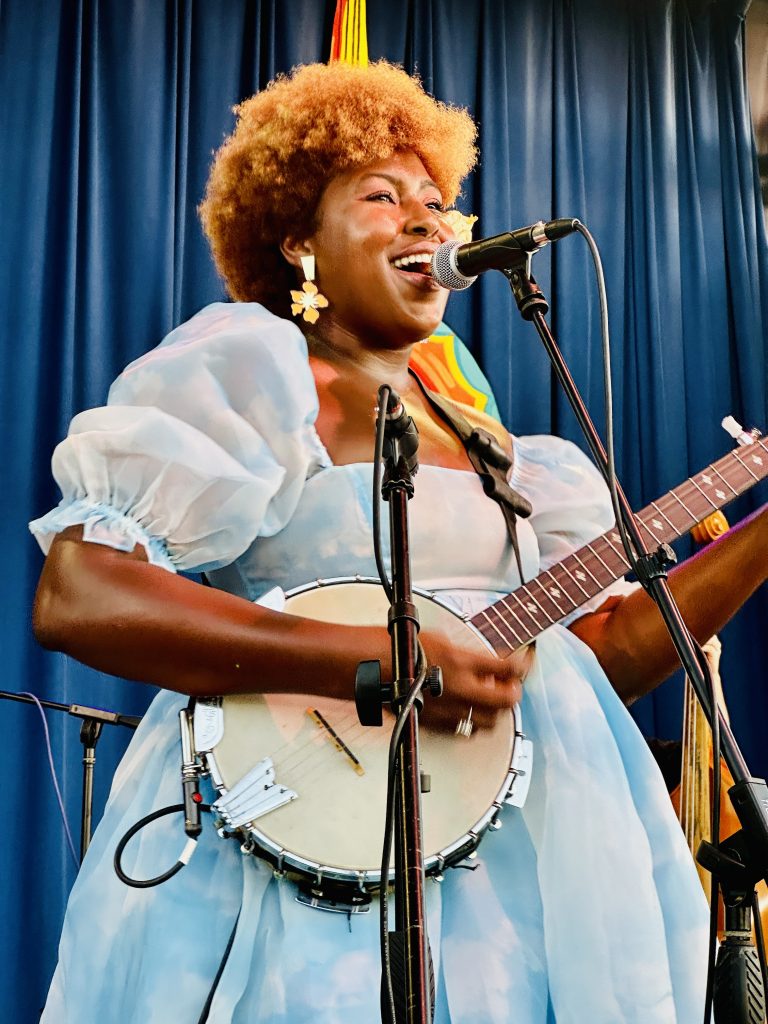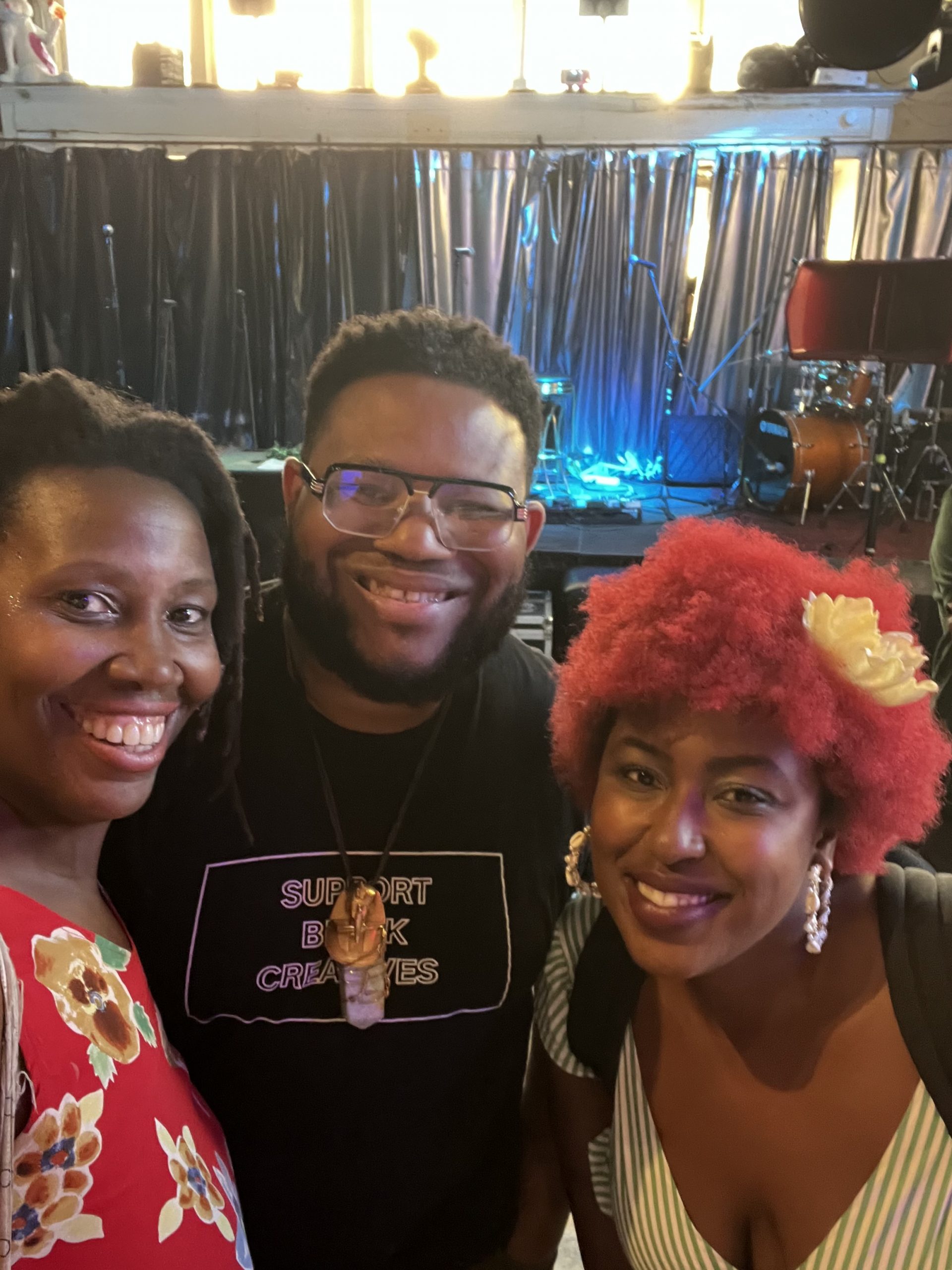“You can’t become what you can’t see,” said singer Dusky Waters, from the grand stage of New Orleans’ inaugural Black Americana Festival.
Held at The Broadside, the Black Americana Festival (BAF) was co-founded by Dusky Waters and Teena May in celebration of Black history, heritage and its contribution to folk music legacy. The festival’s mission was to not only create a space for artists and listeners of the banjo, but to provide contextual knowledge about the Black origins of the genre and some of the instruments that actually make the music.
BAF was created out of the realization that—though New Orleans is known for its hundreds of lively festivals—there was not yet a space for Americana music, especially Black Americana music. Waters, like many Black Americans, understands the isolation of trying to find a home in a place, presumably, unfit for you. In fact, it wasn’t until she experienced the Carolina Chocolate Drops in concert that she was compelled to buy her first banjo.

Dusky Waters. Photo by Kim Welsh / OffBeat
“They talked a lot about the Black history of the banjo and that was the first time that I’d seen Black people playing a form of music I was interested in, but wasn’t sure if I belonged in. That was until I saw someone that looked like me doing it.” Waters explained.
Similarly, Teena May felt “excluded,” from her love of country music, even associating her fondness for genre as a betrayal to her community. The “Nice Man Cold Beer” singer went back and forth with her passion for years until finally after being in New Orleans for two years, everything fell into place at an open mic night and she realized music was her calling. She has been performing ever since.
“Our heritage is storytelling. When I’m playing my music, I’m telling the stories of my predecessors and ancestors. I know now that music is just an extension of my existence,” May said.
Entering Broadside, I’m greeted with all of the incredible Black-owned vendors from Freedom Key Nola, and Nola Sage Lady to Crazy Plant Bae, We Three Kings and more. It’s clear how much intention went into not only the perfect performance line-up, but also the businesses representing the festival. One of the most unique aspects of New Orleans’ first Black Americana Fest has to be the involvement of Arts and Education Curator Mark Williams. William’s main goal was to incorporate a visual representation of the Black origins of folk, blues and jazz; even getting permission from The Nelson-Atkins Museum of Art who loaned two of their paintings to show at the festival. These painting include “Lynch Family Blues,” and “Goodnight, Irene.” The Young Audiences of Louisiana Coordinator also showcased his students’ artworks and included their research in the art display during the festival.
“The point of this festival is to educate folks about the art, people, culture and foundation of American music. We have to include all spectrums of generations because the elders already know the history, but the young people don’t. All generations must be involved in that room’s cultural spectrum because a shared passion does more for communication than shared language. Events like this create that passion for those [music] stages and opportunities for people to connect,” Williams said.
Broadside has two stages. The main stage, named after one of Waters’ greatest inspirations, Sister Rosetta Tharpe, is outside, for bigger ensemble performers, while the second stage is inside, named after Elizabeth Cotten. This smaller stage held the songwriter/panel stage, so the festival created a space for everyone— whether you want to be inside with air conditioning or outside to enjoy a more traditional festival vibe.
During my sit-down with the co-founders, Waters and May, Waters gave a little insight on the process of choosing the line-up, including the amazing Lilli Lewis, who opened the show, followed by co-founder Teena May, then Jeffery Broussard & The Nighttime Syndicate. The show continued with Dusky Waters performing next, followed by Mia Borders, Nikki Hill, Leyla McCalla and lastly, the sensational Joy Clark.
“In terms of the main stage, I just started with my mentors and heroes. Lilli Lewis is a mentor of mine and actually brought me to the Black Music Summit and that was my first introduction into organizing an event like this” said Waters.

Teena May, Mark T. Williams II and Dusky Waters. Photo courtesy of Mark Williams.
The energy of the crowd, even with the heat, was palpable. Everyone was dancing, laughing and singing along with the performers. BAF felt like a true community space for not only folk music, but Black history.
One of the things I was most excited to attend was the “The Roots of Rhythm: Black America History” panel. The discussion was hosted by Dr. Michael White and featured All is Forgiven singer, singer/songwriter/pianist Lilli Lewis; Come Sunday author, Freddi Evans and Black Creole Chronicles poet, author and folkiest Dr. Mona Lisa Salloy. The panel was a chance to delve into the Black origins of Americana and the instruments that characterize it. The banjo, being a huge component of what would later be called “folk,” was the main topic of conversation. It was during this panel that I started feeling right at home in this space. The wisdom from the panelists symbolized the depth of the festival’s theme. We weren’t only celebrating, but acknowledging what was stolen, and rejoicing in its restoration.
“The banjo is an African-originated instrument,” Evans said. She went on to explain how in 1819 a European engineer by the name of Benjamin Latrobe witnessed the banjo being played at one of the Sunday gatherings in Congo Square. “This was not the first time the instrument was played, but what made this time significant is that Latrobe was able to sketch the instrument with the intention of appropriating it.”
Evans goes on to explain how enslaved Africans, as early as the 1820s, were providing banjo lessons to white musicians and by the 1850s there were manuals published on banjo sheet music.
We see a transference from this music—primarily performed by musicians of African heritage—to other musicians of European heritage. Congo Square itself would have contributed to that transition. We know that on Sundays enslaved people would gather in Congo Square by way of their traditions to dance, sing, to play musical instruments, to worship and to market, but there were also hundreds of people who came to watch. They were the spectators, and not only did they come for entertainment, but some of them came to gather material for their circus performances, and minstrel shows.
“The worst part, in doing this, is that they corrupted those practices. They corrupted the instruments and the dances. This made many Black musicians abandon the banjo.” Evans remarked.
Next on the line-up was Ms. Dusky Waters herself, donning a beautiful blue dress and performing the songs from her latest album Pass it On. Dusky Waters also debuted a new single “On King Street,” which will be released October 25. When asked how the banjo connects her with her community, Waters enthused, “My songwriting is about connection to my history, ancestry and this land. It’s rooted in being a Black southern woman. When I pick up the banjo, I’m not just playing an instrument, I’m preserving our history. I’m reclaiming my birthright.”
As perfect as Waters’ performance was, one of the highlights for me was being able to bear witness to the radiance that is Teena May. I could totally believe that her light powered the entire event.
The Black Americana Festival is a day of remembrance, now being celebrated in New Orleans. It’s a time for us to revel in the centuries of music, thought and stories that we have created or inspired. It’s a day to remember that there is no space that we cannot occupy because there is no space we have not occupied. We don’t have to belong anywhere, but we do belong everywhere.
Going forward with Black Americana Fest, May and Waters agree that they only see the festival expanding and they want to always be accessible to their audience, which means keeping the festival with free admission.
“It’s very intentional that the event is free. We’re not achieving our mission if admission is $50. So, we’re trying to focus on keeping the Black Americana Fest free in the future.” said the Pass It On artist.
Dusky Waters will be on tour performing through October, you can check her website for the specific dates. Teena May is headed to Florida and will also be performing different dates through October so be sure to follow up for those specific dates on her website.
The date of next year’s Black Americana Fest has been announced for September 26-27, 2025.




